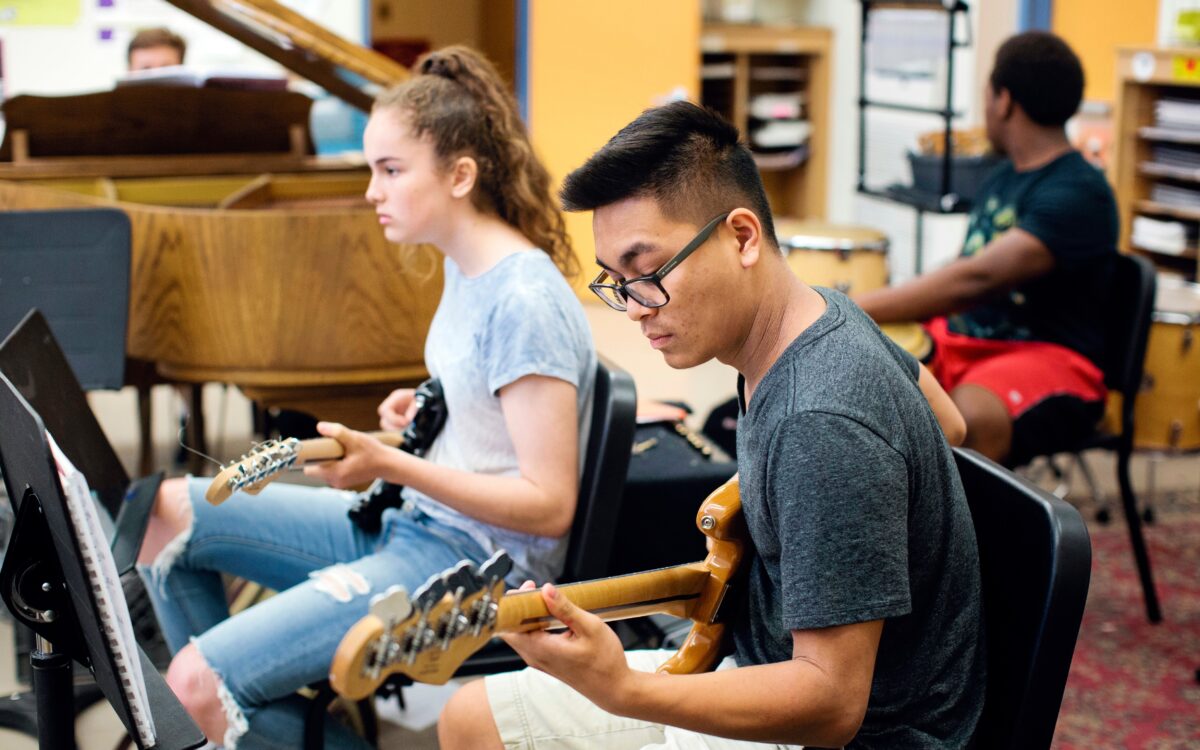California K-12 schools will get a windfall of nearly $1 billion annually for drama, music and other arts programs, thanks to the likely passage of Proposition 28 on Tuesday.
At 2:30 p.m. Wednesday, with more than 5 million votes counted, the initiative was passing by a wide margin, with 61.5% in favor. If the initiative ultimately passes, Proposition 28 will go into effect in 2023.
“(This) is monumental for public education in our state,” said Seth Cohen, president of the Drama Teachers Association of Southern California and a theater teacher at Palos Verdes Peninsula High School in Los Angeles County. “It will help to provide opportunities to students in schools who previously could not afford to bring in qualified educators who have the appropriate backgrounds to support young artists … and (it will) increase the visibility of arts programs on campuses, school districts and in communities.”
Proposition 28 would set aside money in the state’s general fund to give school districts additional funding — at minimum, 1% of the total state and federal money they receive under the Local Control Funding Formula — for arts education. For districts with at least 500 students, the initiative requires that 80% of the funds go to hiring teachers and 20% to training and supplies, such as musical instruments.
Arts education in California has been floundering since the late 1970s, when Proposition 13 decimated funding for public schools. For decades, arts programs were among the first things cut as cash-strapped districts struggled to balance their budgets. Art is not required to graduate from high school in California, and many districts, especially those in low-income areas, have little to no formal arts education, particularly at the elementary level. Only 1 in 5 California schools have a full-time arts program, according to Proposition 28 proponents.
Proposition 28 won strong support from California’s entertainment industry, with backers including Dr. Dre, Quincy Jones, Katy Perry and a slew of other celebrities. A chief supporter was Austin Beutner, former superintendent of Los Angeles Unified, who donated $4.3 million to the yes-on-Propostion-28 campaign. Fender Musical Instruments, maker of Fender guitars, was also a big donor, giving $1.2 million.
The infusion of arts funding is long overdue, said Ted Lempert, president of Children Now, a policy research and advocacy organization focused on children’s welfare in California.
“For too long, arts education has not been prioritized,” he said. “But we know that kids do better in math and reading and other academic subjects when they feel energized, and the arts can help with that.”
Robust arts programs can have a broad positive impact on schools generally, boosting morale, increasing attendance and improving students’ sense of belonging and engagement at school. The arts also play a strong role in students’ social-emotional well-being, which more schools have been prioritizing during the pandemic. And research has also linked arts education to improved cognitive development, especially for younger students, as well as increased math and reading skills.
The initiative is also expected to elevate the arts as a potential career option for young people and enhance the state’s economy by providing skilled workers for the entertainment and arts industries, a $300 billion economy in California with more than 2.6 million jobs.
“Music education supports all education. It fosters reasoning and skills that are the building block for learning other subjects,” Lucian Grainge, chief executive officer of the Universal Music Group, wrote in the official ballot argument for Proposition 28. “This measure is critical not only for education and learning, but also to mental well-being and even the state’s economic health. Companies like ours, that moved to California to be at the nexus of entertainment and technology, rely on a skilled workforce to fill the high-quality jobs we create here. This initiative will ensure a future job-ready workforce and secure California’s position as the global epicenter of music and the arts.”
Beutner described the win as “a big step forward for public education.”
“Prop 28 will provide for the largest investment in arts and music in our nation’s history,” he said. “Arts are the glue which brings together literacy, math and critical-thinking skills to help students succeed in school and in life.”
